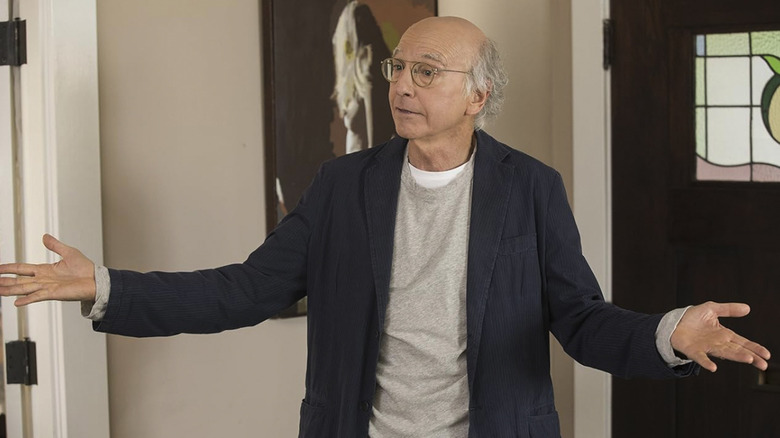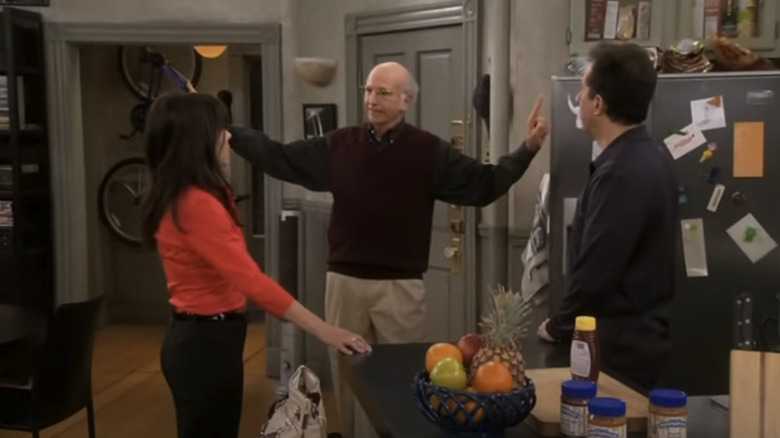Here's Why Larry David Left Seinfeld At The Show's Creative Peak
The year was 1996, and NBC's "Seinfeld" was firing on all cylinders. The "show about nothing" had won an Emmy for Outstanding Comedy Series, Kramer actor Michael Richards had won two Supporting Actor in a Comedy Emmys, Julia Louis-Dreyfus was fresh off her win for Supporting Actress, and co-creator Larry David had already won his Emmy for Outstanding Individual Achievement in Writing for a Comedy Series for season 4's "The Contest," where he was willing to put his job on the line to make sure the episode got made.
But it was at this point, after the seventh season had aired, when Larry David walked away from his creation. Well, that's not entirely true — he stuck around as an actor to continue to do the occasional cameo as Yankees head honcho George Steinbrenner — but it is true that David stopped writing and showrunning "Seinfeld" right around the time it reached its creative peak. Why would anyone walk away from such a massive hit show after such tremendous success? Well, there's a very "Larry David" answer to that question.
"I'd been there for seven years, and that's a long time to suffer the way I do in my daily life," he joked in a 1998 Charlie Rose interview. "Seven years is a long time for someone to executive produce a show like that [...] It wasn't burnout, I had plenty of ideas, it wasn't that ... I just felt I had done that, and now I wanted to try something else. And that's pretty much it."
David said he simply could not work on Seinfeld anymore
Starting in season 2, Larry David would hit a breaking point where he said the most recent season he'd made might be his last time working on the show. Jerry Seinfeld would always talk him off the ledge, but when David said it after the season 7 finale, Seinfeld essentially told him that if that was what he wanted to do, he should leave.
"I just physically didn't want to do it anymore," David elaborated in a behind the scenes featurette. "I just felt like I just can't ... I just couldn't do another one. I don't know. I just had come to the end. So I was hoping that everybody would feel the same way, but I was the only one [laughs]." The show did indeed continue without him for two more seasons under Jerry Seinfeld's sole leadership (David returned to serve as a supervising producer for the series finale at the end of season 9), and Seinfeld wrestled a little with David's exit.
"I have such funny feelings about it, because as much as I felt kind of hurt and upset, because I loved working with him and felt that we had this great chemistry that was so magical, it was probably the best thing that ever happened to me," Seinfeld said in that same featurette. Without David at his side, Seinfeld proved he could keep things operating at a high level as the show's leader, which he found both enormously challenging but creatively satisfying. Some fans maintain that there was a dip in quality after David left, but the show remained hugely popular even in its final years.
David, meanwhile, moved on to write and direct a poorly received movie called "Sour Grapes," and a year later, he released an HBO stand-up special called "Curb Your Enthusiasm," which inspired the long-running hit comedy series. Seinfeld and David made ludicrous amounts of money from selling the syndication rights to "Seinfeld," "Curb" became a comedy institution unto itself, and David even managed to incorporate a whole "Seinfeld" reunion season into his new series without actually committing to doing a "real" one, so it seems like everything worked out for the best.

